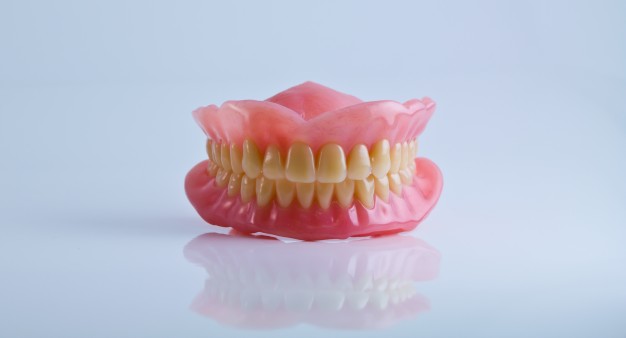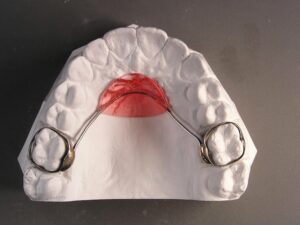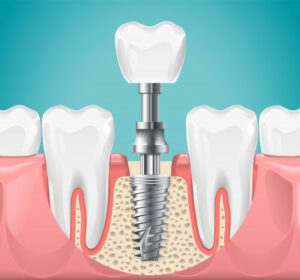What is it? | Types | Pros and cons | Maintenance | Longevity | Eating with dentures | Speech | Cost
Have you lost your natural teeth and want to replace them with artificial teeth? Dentures could be the answer to make your dental system functionally and aesthetically great. Made of acrylic, nylon, or metal, dentures are made to resemble your natural teeth so you will have better facial symmetry, meaning a better smile. Besides aesthetic improvisation, it improves speech, eating capability, and of course, your confidence to smile freely. Technically a false tooth, it fits snugly over the gum and helps in preventing facial sagging over time. Why live with the self-consciousness of missing teeth when you can have the perfect natural-looking teeth to smile with confidence.
What Are Dentures?
Dentures are removable false teeth custom designed and fitted to act as prostheses for missing teeth. Living with missing teeth could be mentally, functionally, and aesthetically traumatic. Dentures are fitted on gum to fill the void created by missing teeth, so it helps in improving appearance, speech, and oral functionalities. Depending on your need, your dentist will recommend full or partial dentures. These are custom designed in the laboratory according to your dental structure, so fitting won’t be an issue. Except for a little discomfort in the early days, dentures are a better alternative to dental implants and dental bridges teeth restoration procedures. It all depends on the suitability and preference, so discuss all possible options with your dentist before opting for dentures.
Different Types of Dentures
Thanks to the advancements made in dental technology, now you have several restorative dental appliances to choose from. Depending on the condition of your dental structure and your preference for fixed or removable false teeth, your dentist will recommend partial dentures or full dentures. Here is all you need to know about denture options:
Full Dentures
The base of full dentures is made of high-quality plastic material or metal and color-matched to mimic gum tissues. It supports false teeth, made of porcelain or plastic material. Your dentist will fit the plate on your gum forming a seal or fix it on dental implants. It is generally recommended for those who have lost all their teeth due to tooth decay or accident.
Partial Dentures
If you want to keep your remaining natural teeth, partial dentures could be a great choice to restore your smile. Partial dentures consist of a plastic base or metal framework to support porcelain teeth. Your dentist will clip partial denture around the remaining teeth using clasps and rests.
Removable Dentures
Removable dentures offer you all the benefits of the traditional denture, along with the added advantage of easy cleaning. These are custom-designed to help you remove as per your need. However, this flexibility makes it susceptible to slipping. So, you have to avoid eating sticky and hard food items. You can use teeth adhesive, but it is difficult to use regularly.
Flexible Dentures
If you are concerned about comfort and durability, you can opt for flexible dentures. The base of the flexible dentures is made of translucent resin, so it will match with gum color. No clasps are used, so it gives you a better appearance. It is relatively slim, lightweight, and durable with a life span of 8-10 years.
How are Dentures Made?
Teeth restoration is a complex procedure that requires special training, so dentures are normally designed and fitted by a prosthodontist. The specialist will examine your dental structure and suggest a suitable type of appliance best for you. Once decided, the process starts with:
- First, taking a series of impressions or mold of the oral tissues that support the denture. Additionally, measurements of jaws are taken to custom design dentures according to the availability of space.
- Based on these measurements and impressions, models, wax forms, or plastic patterns are created in an advanced laboratory.
- The specialist will try this model several times to ensure comfortable fitting, proper bite, and of course, appearance.
- You will be called several times for 4-5 weeks before the final denture is cast.
- The prosthodontist will fit it in your mouth and make some adjustments if the need arises.
Pros and Cons
It is natural to lose teeth, either due to aging or injury. But living with an incomplete dental system affects oral functionalities and your appearance, so it is better to look for tooth restoration options. If you want to restore a smile with the denture, you should know about the pros and cons of the denture to make an informed decision.
Pros
- Dental implants are good but expensive. Dentures give you all the advantages of implants at far less cost.
- People usually start with affordable options and know how they feel.
- Jaws and gums take 9 to 12 months to heal so that implants could be inserted. The immediate denture gives you an option to temporarily restore missing teeth.
- It is much easier to wear dentures according to your comfort and convenience.
- Denture treatment is non-invasive.
- If fitted well, it could easily last for a decade or so.
- It is easy to modify dentures if you lose additional teeth in the future.
Cons
- It is good, but not as natural as dental implants.
- Stability of the plate could be a challenge for some patients
- You have to remove it regularly for cleaning.
- You have to remove it in the night
- It is susceptible to slipping, making eating, speaking difficulty
- You have to avoid eating sticky and hard food items.
- As compared to implants, which last for over 20 years, it is less durable with a lifespan of fewer than 8 years.
- It is prone to breakage
- Partial dentures affect your natural teeth
Tips to Maintain Your Dentures
Any foreign object in your mouth will naturally trigger excessive saliva secretion. Dentures in your mouth will need proper care to avoid bacteria formation, which could cause several other oral diseases. It is better to follow the cleaning instructions given by your dentist. Here are some tips to keep dentures in perfect health and shape:
- Buy a suitable denture cleaning solution to keep it pathogen-free. Different materials need different agents, so ask your dentist to get the best cleaning agent.
- The durability of your denture depends on how effectively you handle it.
- Avoid bending as it could damage the structure
- Don’t play with clips as it will affect fitting
- Keep it soaked in water to avoid drying out. Don’t forget to rinse it thoroughly before putting it again in the mouth.
- Avoid foods as suggested by your dentist
- Avoid drinking hot and colored beverages
How Long Do Dentures Last?
The durability of dentures depends on fitting and proper care. In the best-case scenario, dentures could last 7-8 years. As the bone shrinks with time, dentures become loose. You should visit your dentist at regular intervals so that he could make adjustments if required. If cracks develop in teeth or acrylic base your dentist will repair it in the lab.
What Do New Dentures Feel Like?
New fitted dentures can be a little uncomfortable and bulky in the mouth. As the muscle of cheek and tongue gets accustomed to the denture, your comfort level will increase significantly in a week or so. The presence of a foreign object in the mouth could trigger excessive saliva secretion, and in some cases cause irritation and sensation. Side effects subside in a few days, but if it persists you should consult your dentist to seek a remedy.
Will Eating With New Dentures Be Difficult?
You have to learn to eat with dentures as your gums might respond differently while eating regular food. You should start with soft food items and gradually move to harder food cut into small pieces. It is better to chew slowly, using both sides of the mouth. You should avoid too hot and hard items in the early days.
Will Dentures Change How I Speak?
Dentures affect the natural movement of the tongue, so you might experience difficulty in speaking some words. With time, your tongue will get accustomed to the denture plate, and your pronunciation will become normal. If speech impairment persists, you should consult your dentist to make some adjustments.
How Much Do Dentures Cost?
The cost of the denture will vary widely depending on the expertise, location, the number of teeth, and of course, the materials used in custom designing the denture. The cost of partial and full denture costs almost the same, with a starting price of $300. However, the cost could go up to $8000 if you opt for more comfortable and good-looking dentures.
The flexible dentures made of translucent resin typically cost $700 to $3,000 for a partial set. They are more expensive than other methods and can only be used for partial dentures. Flexible dentures typically cost between $700 and $3,000 for a partial set.
Your overall spending could be less if you have dental insurance as most insurers cover the full or partial cost of denture treatment. However, you should discuss coverage with your insurer before you start the treatment.
Conclusion
Dentures are unquestionably one of the most popular teeth restoration appliances. Besides affordability, it gives you the much-needed flexibility in maintaining oral hygiene. However, it all depends on the suitability of the treatment. If your dentist suggests, you can opt for bridges and implants. If you want something more stable and durable, you can discuss dental implants with your dentist, however, the cost of treatment would be very high.
Sources:
- Miller, Paul A (1958). “Complete dentures supported by natural teeth.”
https://www.sciencedirect.com/science/article/pii/0022391358901227 - Creugers, N. H. J., and C. de Baat (2009). “Removable partial dentures. Oral functions and types.”
https://repository.ubn.ru.nl/handle/2066/79736 - Shay, Kenneth (2000). “Denture hygiene: a review and update.”
https://www.thejcdp.com/doi/pdf/10.5005/jcdp-1-2-36 - Tandon, Renu, Saurabh Gupta, and Samarth Kumar Agarwal (2010). “Denture base materials: From past to future.”
https://www.academia.edu/download/35478221/article-pdf-renu_tandon_saurabh_gupta_samarth_kumar_agarwal-63.pdf



